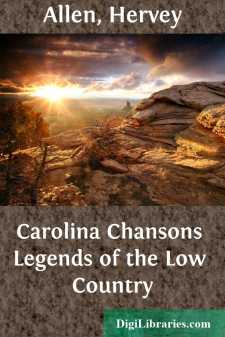Poetry
American Books
Sort by:
FIFTY YEARS & OTHER POEMS FIFTY YEARSO brothers mine, to-day we standWhere half a century sweeps our ken,Since God, through Lincoln's ready hand,Struck off our bonds and made us men.Just fifty years—a winter's day—As runs the history of a race;Yet, as we look back o'er the way,How distant seems our starting place!Look farther back! Three centuries!To where a naked, shivering...
more...
INTRODUCTION If we define poetry as the heart of man expressed in beautiful language, we shall not say that we have no national poetry. True, America has produced no Shakespeare and no Milton, but we have an inheritance in all English literature; and many poets in America have followed in the footsteps of their literary British forefathers. Puritan life was severe. It was warfare, and manual labor of a...
more...
by:
Henry Van Dyke
I. PRELUDE Daughter of Psyche, pledge of that last nightWhen, pierced with pain and bitter-sweet delight,She knew her Love and saw her Lord depart,Then breathed her wonder and her woe forlornInto a single cry, and thou wast born?Thou flower of rapture and thou fruit of grief;Invisible enchantress of the heart;Mistress of charms that bring reliefTo sorrow, and to joy impartA heavenly tone that keeps it...
more...
The Kings and Queens of England, From the Battle of Hastings or the Norman Conquest, to the Present Reign, Inclusive. First, William the Norman lays claim to the crown And retains it till death; then follows his son The red headed William, whose life is cut short By a shot from his friend, when hunting for sport. Then Henry his brother takes quiet possession, As Henry the first, of the great English...
more...
by:
Hervey Allen
SÉANCE AT SUNRISEPlace the new handsIn the old handsOf the old generation,And let us tilt tablesIn the high roomOf our imagination.Let the thick veil glow thin,At sunrise—at sunrise—Let the strange eyes peer in,The red, the black, and the white facesOf the still living deadOf the three races.Let a quaint voice begin: Voice of an Indian "Gone from the land,We leave the music of our names,As...
more...
PREFACE In March, 1914, a volume appeared entitled "Des Imagistes." It was a collection of the work of various young poets, presented together as a school. This school has been widely discussed by those interested in new movements in the arts, and has already become a household word. Differences of taste and judgment, however, have arisen among the contributors to that book; growing tendencies...
more...
PREFACE This little volume was written for no reason on earth and with no earthly reason. It just simply happened, on the principle, I suppose that "murder will out." Murder is a bad thing and so are nonsense rhymes. There is often a valid excuse for murder; there is none for nonsense rhymes. They seem to be a necessary evil to be classed with smallpox, chicken-pox, yellow fever and other...
more...
by:
Emily Dickinson
I. SUCCESS. [Published in "A Masque of Poets"at the request of "H.H.," the author'sfellow-townswoman and friend.] Success is counted sweetestBy those who ne'er succeed.To comprehend a nectarRequires sorest need. Not one of all the purple hostWho took the flag to-dayCan tell the definition,So clear, of victory, As he, defeated, dying,On whose forbidden earThe distant strains of...
more...
by:
Michael Earls
HIS LIGHT Gray mist on the sea,And the night coming down,She stays with sorrowIn a far town. He goes the sea-waysBy channel lights dim,Her love, a true light,Watches for him. They would be weddedOn a fair yesterday,But the quick regimentSaw him away. Gray mist in her eyesAnd the night coming down:He feels a prayerFrom a far town. He goes the sea-ways,The land lights are dim;She and an altar lightKeep...
more...
PART THE FIRST. I IN the Acadian land, on the shores of the Basin of Minas, Distant, secluded, still, the little village of Grand-Pré Lay in the fruitful valley. Vast meadows stretched to the eastward, Giving the village its name, and pasture to flocks without number. Dikes, that the hands of the farmers had raised with labor incessant, Shut out the turbulent tides; but at...
more...











